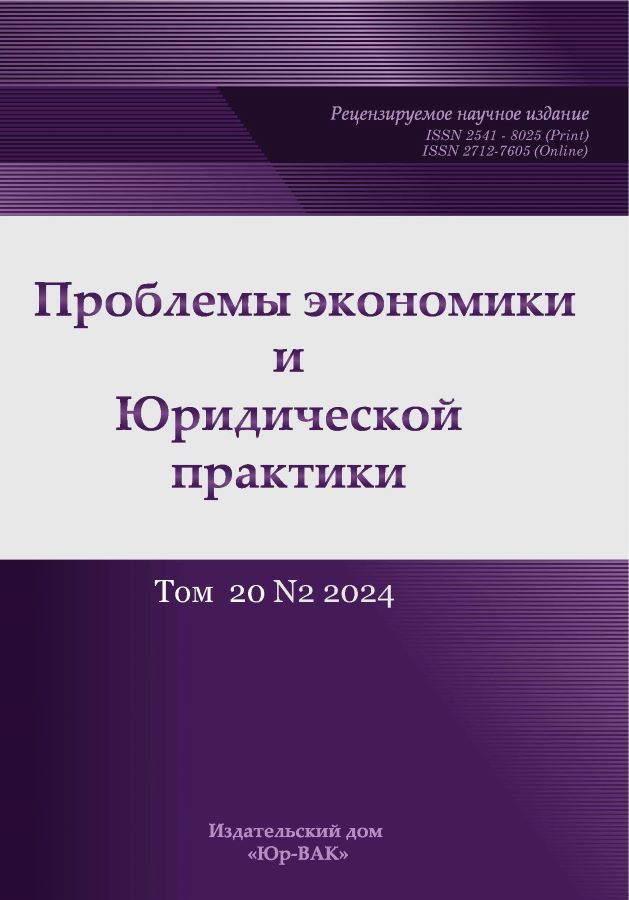Waqf in Partnership Financing: Key Features of Using the Tool
- Авторлар: Iskhakova G.M.1, Ildarkhanova A.K.1
-
Мекемелер:
- Kazan (Volga region) Federal University
- Шығарылым: Том 20, № 2 (2024)
- Беттер: 303-308
- Бөлім: Management
- URL: https://journals.eco-vector.com/2541-8025/article/view/633906
- EDN: https://elibrary.ru/ZSVJTE
- ID: 633906
Дәйексөз келтіру
Аннотация
The purpose of the research. The article reveals the content of standard No. 60 «Waqf» (AAOIFI) on corporate governance of Islamic financial institutions, which was developed and published by the «Accounting and Auditing Organization for Islamic Financial Institutions»—(AAOIFI), registered in Bahrain. For the development of partner (Islamic) financing activities in Russia, it is very important to scrupulously study the significant experience in developing standards for the functioning of Islamic financial institutions accumulated by AAOIFI, including management standards. In Russia, this is the first translation into Russian of the professional language of AAOIFI standards for managing the activities of Islamic financial organizations. Interest in partner (Islamic) financing is especially growing in regions with a prevailing concentration of residents professing Islam, who are not able to use a number of traditional services, including banking, due to their religious values. Interest in partner (Islamic) financing is especially growing in regions with a prevailing concentration of residents professing Islam, who are not able to use a number of traditional services, including banking, due to their religious values. Over the past decade, a number of constituent entities of the Russian Federation have accumulated some experience in implementing individual operations based on the principles of partnership (Islamic) financing. The presence of potential domestic demand for partner financial instruments is the basis for expanding their supply. In this regard, the question arises of forming a system of internal Sharia control exclusively for Islamic financial institutions as part of an experiment in partner (Islamic) financing. The purpose of this study is to uncover some of the accounting issues in Wakf institutions, analyzing the nature of Wakf institutions with a view to establishing whether their respective financial accounting and reporting practices should be commercial, non-profit or mixed.
Негізгі сөздер
Толық мәтін
Авторлар туралы
Gulia Iskhakova
Kazan (Volga region) Federal University
Хат алмасуға жауапты Автор.
Email: gulia1201@yandex.ru
ORCID iD: 0000-0002-8586-2624
SPIN-код: 1239-5674
senior lecturer at the Department of Project Management and Business Assessment
Ресей, KazanAlmira Ildarkhanova
Kazan (Volga region) Federal University
Email: almira.kfu@mail.ru
ORCID iD: 0000-0002-2676-9868
SPIN-код: 7567-6604
Cand. Sci. (Econ.), Associate Professor of the Department of Project Management and Business Assessment
Ресей, KazanӘдебиет тізімі
- http://aaoifi.com/announcement/aaoifi-publishes-exposure-draft-on-internal-shariah-audit-and-invites-opinion-from-islamic-finance-industry/?lang=en.
- Derzayeva G.G., Accounting policy of construction companies in accordance with International Financial Reporting Standards//IOP Conference Series: Materials Science and Engineering. —2020. —Vol.945, Is.1. —Art. № 012009.
- Ibrahim, D.B., & Ibrahim, H.B. (n.d.). Revitalization of Islamic trust institutions through corporate waqf. Retrieved July 10, 2019, from https://www.academia.edu/9186209/Revitalization_of_Islamic_Trust_Institutions_through_Corporate_Waqf.
- Ihsan, H. and Adnan, M.A. (n.d.). Waqf accounting and the construction of accountability. Retrieved August 10, 2019, from https://www.academia.edu/504496/Waqf_Accounting_and_The_Construction_of_Accountability.
- Kharisova F.I, Iskhakova G.M, Yusupova A.R, Kharisov I.K. Formation of financial statements at Islamic financial institutions//Journal of Social Sciences Research. —2018. —Vol.2018, Is.Special Issue 5. —P. 128–132.
- Kharisova F.I., Derzayeva G.G., Iskhakova G.M, Sabirova A.I. Review of AAOIFI Standards for Governance of Islamic Financial Institutions (№ 1—№ 14): tutorial / Kharisova F.I., Derzayeva G.G., Iskhakova G.M, Sabirova A.I. —Kazan, Saratov, Amirit, 2023. —p. 396.
- Nurazalia Zakaria, Noraini MohdAriffin, Nor Hafizah Zainal Abidin «Internal Shariah Audit Effectiveness and its Determinants: Case of Islamic Financial Institutions in Malaysia» // Kyoto Bulletin of Islamic Area Studies. —12 (March 2019), pp. 8–28.
- Nor Aishah Mohd Ali, S. Shahida, Zurina Shafii, «Knowledge, Skills and Characteristics Requirements for шариат Auditors» // Asian Journal of Accounting and Governance, 9: 181-200 (2018).
- Shulthoni, M., & Saad, N. M. (2018). Waqf fundraising management: a conceptual comparison between traditional and modern methods in the Waqfinstitutions. Indonesian Journal of Islam and Muslim Societies, 8 (1), 57-86. https://doi.org/10.18326/ijims.v8i1.57-86.
- Kharisova F.I., Iskhakova G.M. Problems of accounting in waqf institutions // State and market: the Eurasian dominant of development in the conditions of the formation of a multipolar world: collective monograph / ed. Doctor of Economics sciences, prof. S.A. Dyatlova, Doctor of Economics. Sciences, D.Yu. Miropolsky, Doctor of Economics. sciences, prof. T.A. Selishcheva. —St. Petersburg. : Publishing house of St. Petersburg State Economic University, 2023. —p. 377–388.
- YazkhiruniYahya, NurmazilahMahzan The Role of Internal Auditing in Ensuring Governance in Islamic Financial Institutions / Innovation and Knowledge Management: A Global Competitive Advantage. —с. 2158–2162
- Kharisova F.I., Derzaeva G.G., Aletkin P.A., Tukhvatullin R.Sh. Corporate social responsibility as an ESG principle in the light of the federal law on partnership financing // Kazan Economic Bulletin, 2023, No. 3. pp. 80–88.
- Umar, U. H., & Kurawa, J. M. (2019). Business succession from Islamic an accounting perspective, ISRA International Journal of Islamic Finance, 11 (2), 267-281. https://doi.org/10.1108/IJIF-06-2018-0059.
- Umarov Kh.S. The role of the ethical component in the review of approaches and methods to the organization of creative accounting in world practice / Kh.S. Umarov // Innovations and investments. —2018. —No. 8. —P. 231–234.
- Umarov Kh.S. Ethical components of accounting information of Islamic financial institutions / Kh.S. Umarov // International accounting. —2019. —No. 8. —P. 921–929.
- Umarov H.S. Islamic (partner) accounting and its comparison with international financial accounting standards (IFRS) / E.Y. Voronova, H.S. Umarov // Universal Journal of Accounting and Finance. —2021. —№9 (2). —Р. 267–274.
Қосымша файлдар








